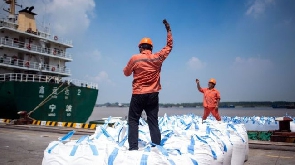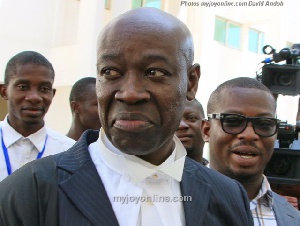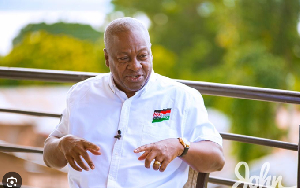The Director General of the Ghana Ports and Harbours Authority, Mr. Michael Luguje, has projected that in 2020 cargo volumes are likely to surge as both Tema and Takoradi Ports have positioned themselves as transhipment and oil and gas services hubs respectively.
“We are looking forward to doing better. This is because Terminal 3 is going to attract more business in 2020. We think that our ports themselves are well-geared to do much more than the previous years. Takoradi is also going to do more in the oil and gas services,” he stated.
The DG of GPHA, who appeared on Eye on Port’s panel discussion interactive platform to discuss GPHA’s Perspective of Ghana’s Port and Maritime Industry in 2019 and Projections for 2020, revealed that the Port Authority has made major investments to enable Ghana’s ports serve as an incentive for the facilitation of intra-African trade, following implementation of the African Continental Free Trade Area agreement.
“We have positioned our ports for global trade. And while we do that, we also are looking forward to more intra-African trade going maritime,” he disclosed.
He revealed that the Port of Tema, for instance, has been positioned as the best in terms of infrastructure in the West and Central African sub-region – ahead of all other ports in the sub-region.
“If you look at port infrastructure in the perspective of container capacity, Ghana is leading today in West and Central Africa,” he said.
He emphasised as well that MPS Terminal 3 within the Tema Port operates on a first-come first-serve basis, and does not prioritise certain shipping lines – hence, giving the Tema Port a competitive advantage over other ports.
“MPS Terminal 3 is an independent multi-user terminal. You come and you are served based on your berthing window; the one who comes after you must wait. MPS is open to anyone who has a container to come and load or offload in Tema Port,” he highlighted.
The investment made so far into the Port of Takoradi, according to Mr. Luguje, will boost its import handling capacity to make it comparable with that of Tema while augmenting its interventions to grow that of the export sector.
“We are expecting that with all the expansion projects going on, and the kind of direction the Western Region is going in the Oil Industry growth, we are going to see Takoradi in the coming years as an alternative port for imports. It is going to give Tema very good competition,” he said.
Michael Luguje described the 2019 year as a productive one, despite the many challenges faced by the industry.
“We have not had December’s report yet, but looking at January to November’s figures we are fortunate to see Tema Port’s total throughput growing by about 5% compared to 2018, and Takoradi recording about 21% compared to 2018,” he said.
He praised government’s initiative of reducing benchmark values of duties, expressing that this incentive will boost importers’ appetite to use Ghana’s ports, as well as ease the cost of doing business in the country.
“Governments’ deliberate policy on reduction of the benchmark values for Customs duties was a very unique opportunity within the port sector – because the expectation is that, at least, importers will find it more affordable to import. We expect it to encourage importers and traders to realise that they can now import at a relatively cheaper cost,” he applauded.
On transit trade, which he described as the most competitive part of the port business, Mr. Luguje said the Port Authority is doing a lot – including applying competitive tariffs to woo cargo bound for landlocked countries through the Ghanaian corridor.
“Last year, we needed to reach out to the landlocked countries once again and be able to discuss quite a number of things and exchange a lot. We got a lot of feedback on the type of service that we provide, the quality of the service and their challenges; but sometimes if you meet them at their own doorstep, where their businesses are established, they are able to better-share experiences with you,” he said.
He however urged the Customs Division to reconsider its decision to charge 17.5% VAT on transit cargoes, saying it is a challenge the transit countries have lamented about.
“Normally, transit cargo services should not have attracted VAT; but unfortunately the GRA insists that VAT should be charged on tariffs for transit goods. The VAT is 17.5%, which is quite significant. This is the major complaint importers and exporters of landlocked countries have,” he advised.
He also said his outfit is collaborating with the police to eliminate harassment on the Ghanaian corridor.
“Ideally, what the police should have done was – on such checkpoints that are mainly for road security reasons – to have allowed free passage of trucks that are carrying transit goods, but naturally once they are on the road to deal with security matters; the tendency to stop all trucks that come in and probably ask a few questions comes into light. There is a lot of sensitisation going on in the police service now,” he revealed.
Mr. Michael Luguje also advocated for improvement of Ghana’s rail infrastructure to give it a major competitive advantage in the transit business.
He also explained the significance of having a revamped world-class shipyard and repair facility in close proximity, and expressed hope that government will expedite processes which would lead to revamping the Tema Shipyard. He revealed that an amount of 100million dollars would be required to fully revamp the Tema Shipyard.
“The advantage we have is that if you have your shipyard close to your ports working well, it means that Shipping Lines can plan, saying ‘we will just go and offload our cargo at Tema Port and quickly go to dry-dock for repairs’. This is advantageous because Shipping Lines will not say that they will not go and offload cargoes in Tema and sail empty to a faraway shipyard for repairs,” he revealed.
The Director General of GPHA disclosed that by 3rd quarter of 2020, GPHA will have a consultant to provide full feasibility studies on the Keta Port in order to have the blueprint needed for developung that port.
“We want this particular consultant to work faster than that. We need results before the end of 2020, so that we have a clear mind by the time we start 2021 as to how we are going to develop the port of Keta,” he said.
Mr. Luguje cleared the erroneous conception regarding loss of revenue through transfers of containers from on-dock terminals to off dock terminals, and requested that Customs reverse its decision on the reefer terminal.
“Reefer containers cannot and have never been the subject of any loss. Because of that directive, GPHA’s investment in the reefer terminal is virtually going to waste. We have petitioned Customs and they are considering exempting the reefer containers from that directive,” he stated.
Mr. Michael Luguje, who doubles as President of the Port Management Association of West and Central Africa (PMAWCA), also clarified the impression that the Port of Lome operates a free port system – describing this as a misconception.
On having GPHA as an authority with overarching responsibility that regulates and steers the affairs of other operators within the ports and their behaviour, the Director-General revealed that there is legislation backing GPHA with such a mandate but it has largely been disregarded – and so agreed to an earlier submission by the chairman of the Parliamentary Select Committee on transport to have Cabinet intervene in the matter.
“We already have the mandate to make sure that anybody operating within the port, no matter the authority, should listen to the advice and direction of the Port Authority as long as it does not prevent you from performing your statutory function,” he said.
Mr. Luguje encouraged stakeholders of the port, including traders, to take advantage of his open-door policy to collaborate and improve Ghana’s port industry for national economic growth.
Business News of Thursday, 16 January 2020
Source: thebftonline.com

















